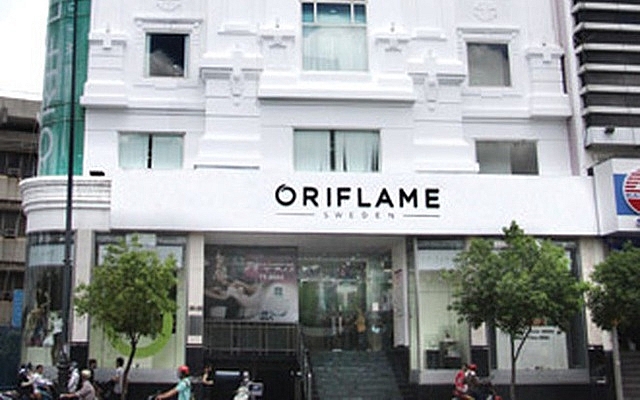MLM enterprises dodge licencing by setting up new entities
 |
| One of the largest MLM enterprises in Vietnam, Stella Ivy Cosmetic will continue operations under a new name |
Stella Ivy Cosmetic Co., Ltd., a distributor of Oriflame-branded products, which used to be one of the four multi-level marketing (MLM) companies with the largest revenue in Vietnam, officially stopped operation after its license expired. Subsequently, it established a new legal entity named Oriflame Vietnam Co., Ltd., operating under the same direct sale model.
However, there was suspicion whether the company met the criteria to extend its MLM license. This was the reason the company had to change to its name, essentially donning a new mask while operations were maintained as usual.
Phuong Thuy, a counsellor of Oriflame, said that she was notified about the change in November 2019, however, she and other distribution agents did not care much as there were no alterations to the company’s performance or structure, including personnel, sales incentives, and discount policy.
The suspicions about Stella Ivy Cosmetics’ license were rooted in past violations. In August 2018, the company was fined for VND170 million ($7,400) since it failed to follow its obligations on revoking multi-level sales member cards. In addition, the company conducted multi-level sales in centrally-run cities and provinces without approval from respective departments and did not issue labour contracts to its sale staff.
The company was also fined in August 2018 because of the lack of proper training for its sales staff in its MLM network.
According to regulations, sales agents are not allowed to act like trained health professionals, because medical examinations and prescriptions, as well as the sale of food supplements, are the domain of certified individuals and organisations.
As shown by statistics published by the Ministry of Industry and Trade’s Vietnam Competition Agency (VCA), as of June 2019, 817,034 people signed contracts to join Oriflame’s MLM network. The total revenue from MLM activities in the first half of 2019 amounted to VND5.8 trillion ($252.17 million), equalling 53 per cent of the company’s revenue for the whole year of 2018. The total commission the company paid sales staff and agents was VND1.92 trillion ($83.48 million), accounting for 36.2 per cent of its revenue.
According to Trinh Anh Tuan, deputy director general of the VCA, after Decree No.40/2018/ND-CP came into effect in 2018, MLM activities have been tightened even further. If MLM companies did not submit dossiers to the VTA fulfilling the new conditions introduced by the decree before January 2019, they would have to halt operations.
As a result, many companies ceased operations in 2019, including many big names such as G10 International Co., Ltd. and Med Media Co. The VCA also revoked the business licenses of five other companies that did not comply with Vietnam’s laws on MLM, including CNI Vietnam, Sen Viet Group, and Rain International Vietnam.
However, dishonest MLM companies use subtle tricks and target human greed by promising huge commissions, which means there is no shortage of eager investors. This requires authorities to extend communications campaigns to educate people and warn them against becoming a victim of fraudulent MLM companies.
Most recently, Hanoi’s Department of Industry and Trade has warned citizens of signs of fraud at electronic payment wallet Payasian. Since Payasian’s e-wallet has not been licensed by the authorities, the money put on these accounts cannot be used legally in the country. Additionally, Payasian JSC has been under suspicion of illegally raising capital and acting as an MLM. The VCA has yet to issue an MLM registration certificate to Payasian JSC.
As numerous dishonest companies are partaking in MLM, Lai Ngoc Thanh, lawyer of Basico law firm said clarifying the quality of products is one way to determine whether an MLM company is trustworthy or not. If the company acquires profit from distributing high-quality products, they are more likely legitimate. In case a company distributes low-quality products (or no products at all), while simultaneously enticing people to pay and join the network to acquire massive profit, they may be involved in illegal activities.
What the stars mean:
★ Poor ★ ★ Promising ★★★ Good ★★★★ Very good ★★★★★ Exceptional
Related Contents
Latest News
More News
- VNPAY and NAPAS deepen cooperation on digital payments (February 11, 2026 | 18:21)
- Vietnam financial markets on the rise amid tailwinds (February 11, 2026 | 11:41)
- New tax incentives to benefit startups and SMEs (February 09, 2026 | 17:27)
- VIFC launches aviation finance hub to tap regional market growth (February 06, 2026 | 13:27)
- Vietnam records solid FDI performance in January (February 05, 2026 | 17:11)
- Manufacturing growth remains solid in early 2026 (February 02, 2026 | 15:28)
- EU and Vietnam elevate relations to a comprehensive strategic partnership (January 29, 2026 | 15:22)
- Vietnam to lead trade growth in ASEAN (January 29, 2026 | 15:08)
- Japanese business outlook in Vietnam turns more optimistic (January 28, 2026 | 09:54)
- Foreign leaders extend congratulations to Party General Secretary To Lam (January 25, 2026 | 10:01)

 Tag:
Tag:

























 Mobile Version
Mobile Version